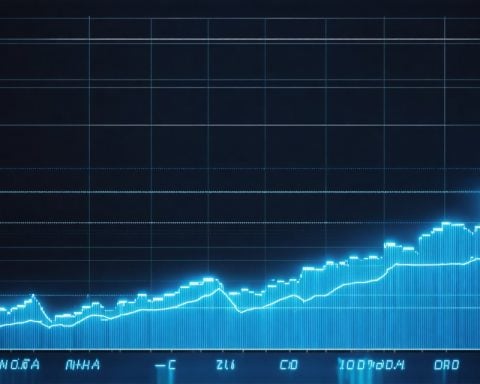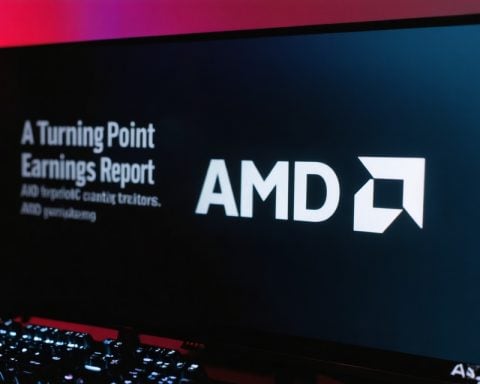AI Chip Sector Faces Turbulence as New Export Regulations Loom
Major players in the artificial intelligence (AI) chip market are experiencing significant sell-offs amid new governmental regulations impacting exports. Industry giants, including Nvidia, Taiwan Semiconductor Manufacturing Company (TSMC), and Micron Technology, saw declines of 2.4%, 3.4%, and 4.8%, respectively, during today’s trading session.
The downturn follows the announcement from U.S. officials regarding stricter controls on the export of cutting-edge chips crucial for AI applications. Aimed at preserving the technological edge of the U.S. and its allies, these regulations will restrict the export of advanced semiconductor technology to countries viewed as adversaries, including China, Russia, Iran, and North Korea, while allowing allied nations to access these technologies freely.
This news particularly affects Nvidia, renowned for its powerful GPUs that are fundamental to AI data centers, and Micron, which supplies essential memory components for these processors. While Micron might face less immediate fallout from the regulations, the intertwining nature of the semiconductor supply chain means it could still face a challenging growth landscape.
TSMC, with its critical role in chip manufacturing and proximity to China, enters a precarious position given the geopolitical tensions. The intersection of technology leadership and national security emphasizes the growing significance of TSMC in the global semiconductor landscape, marking it as a company of immense importance amid rising U.S.-China tensions. Investors will need to stay alert as these dynamics unfold.
AI Chip Sector Faces Turbulence as New Export Regulations Loom
The recent turbulence in the artificial intelligence (AI) chip sector serves as a significant case study in the interplay between government policies, technological advancement, and global market dynamics. Major chip manufacturers like Nvidia, Taiwan Semiconductor Manufacturing Company (TSMC), and Micron Technology recently experienced substantial stock declines due to impending export regulations from the U.S. aimed at controlling semiconductor technology access to rival nations such as China, Russia, Iran, and North Korea.
The implications of these regulations extend far beyond financial markets; they touch on critical aspects of the environment, humanity, and the future of the global economy. This situation raises pivotal questions about the sustainability of the ever-growing tech landscape and our reliance on AI-driven advancements.
Environmental Impact
As companies race to innovate more efficient AI technologies, the environmental impact of chip manufacturing and semiconductor production comes into sharp focus. The semiconductor industry is known for its heavy resource consumption and significant carbon footprint. The processes involved in producing high-performance chips require vast amounts of water and energy while generating considerable electronic waste. With the potential for extensive supply chain disruptions due to these export regulations, there may be further delays in the transition toward greener, more sustainable semiconductor technologies. If companies are not proactive in adopting environmentally friendly practices, the regulatory climate could inadvertently escalate environmental degradation rather than fostering a more sustainable future.
Humanity and Technological Inequities
The tightening of export regulations also highlights the inequalities that can emerge in technological progress between allied nations and adversarial states. By allowing only certain countries access to cutting-edge technology, we risk creating a divided world in terms of technological capability and economic growth. This inequality may hinder collective global efforts to address pressing humanitarian issues like climate change, health crises, and poverty alleviation, which increasingly rely on advanced technologies. Humanity’s interconnected challenges require collaboration and shared access to technological resources; otherwise, we could see disparities that lead to further geopolitical tensions.
Economic Consequences
From an economic standpoint, the regulations could hinder innovation and investment in the AI chip sector. As companies like Nvidia and TSMC face uncertainties, the broader implications may stifle economic growth and lead to job losses in the tech sector. Furthermore, if allied nations begin investing heavily in their semiconductor capabilities to safeguard against future disruptions, we could witness a schism in the global tech economy, impacting international trade and cooperation. Economic offers and partnerships that encourage joint technological initiatives may diminish as companies become more protective of their innovations.
The Future of Humanity
Looking ahead, the regulation-induced challenges in the semiconductor industry underscore the importance of developing a sustainable and inclusive technological ecosystem. As nations navigate the complexities of national security, economic competitiveness, and climate responsibility, it will be vital to foster collaboration rather than confrontation. Establishing international standards for technology development and export could create a framework that balances security with equitable access to advancements.
In conclusion, while the current turbulence in the AI chip sector may seem like a financial issue, it is emblematic of larger global dynamics that will shape humanity’s future. Environmental sustainability, equitable access to technology, and the stability of the global economy are at stake. The choices made by governments, industry leaders, and consumers today will carve out the path for future technological development and its role in improving life on Earth. The hope is that through awareness and cooperation, we can catalyze an era where technology serves as a bridge rather than a barrier.
AI Chip Market in Turmoil: What You Need to Know!
AI Chip Sector Faces Turbulence as New Export Regulations Loom
The artificial intelligence (AI) chip sector is currently navigating a turbulent landscape characterized by recent government export regulations. Major companies in this field, including the likes of Nvidia, Taiwan Semiconductor Manufacturing Company (TSMC), and Micron Technology, have experienced significant sell-offs on the stock market. This downturn follows the announcement by U.S. officials of stricter controls on exports of advanced chips, which are essential for AI applications.
Overview of Export Regulations
These new regulations are primarily designed to maintain the technological supremacy of the United States and its allies. The restrictions specifically target the export of cutting-edge semiconductor technologies to nations perceived as adversaries, including China, Russia, Iran, and North Korea. Meanwhile, allied countries will have access to these vital technologies, potentially leading to a reconfiguration of global semiconductor supply chains.
Key Players Affected
1. Nvidia: Recognized for its high-performance GPUs that are pivotal for AI data centers, Nvidia faces immediate ramifications from the export controls. As global demand for AI solutions surges, these restrictions could stifle Nvidia’s growth and innovation efforts in foreign markets.
2. Micron Technology: Although Micron may experience less direct impact, the interconnected nature of the semiconductor supply chain means that it too will confront challenges, particularly concerning memory components essential for AI processors.
3. Taiwan Semiconductor Manufacturing Company (TSMC): With its vital role in the semiconductor ecosystem, TSMC finds itself in a precarious position amid these tensions. Its strategic proximity to China presents both risks and opportunities as geopolitical factors become increasingly crucial in chip manufacturing.
Market Analysis and Investor Insights
The immediate market reactions have been evident, with Nvidia’s shares dropping 2.4%, TSMC’s by 3.4%, and Micron’s by 4.8% during recent trading sessions. Investors are advised to closely monitor these developments, as they signal potential long-term shifts in the AI chip landscape. Factors to consider include:
– Regulatory Trends: Understanding how these regulations evolve will be critical for investors focusing on semiconductor stocks.
– Competitive Landscape: Innovation and adaptation will determine which companies can thrive despite these restrictions.
– Supply Chain Dynamics: The interconnectedness of the semiconductor supply chain may compel manufacturers to seek alternative markets and partnerships.
Potential Use Cases and Innovations
Despite the regulatory challenges, there remain significant opportunities for innovation within the AI chip sector. Companies may explore:
– Alternative Markets: With heightened restrictions on certain countries, there may be newfound opportunities in burgeoning tech markets throughout Southeast Asia and Eastern Europe.
– Technological Advancements: Firms may accelerate research and development to create new chips that are less restricted or develop technologies that operate within the new regulatory frameworks.
Limitations and Predictions
– Potential Limitations: Restrictions could impede the global pace of AI development, particularly impacting collaborative projects that rely on shared technology resources.
– Future Predictions: Analysts predict a potential reshaping of the global semiconductor market, emphasizing the need for companies to adapt to an increasingly fragmented environment.
Conclusion
The AI chip sector is poised for transformational changes as export regulations reshape its landscape. Stakeholders ranging from investors to technology firms must navigate the complexities of national security concerns and global competition. As the situation continues to evolve, keeping a close eye on regulatory developments and market responses will be crucial for capitalizing on emerging opportunities.
For more information on market trends and analyses, visit Forbes.

















